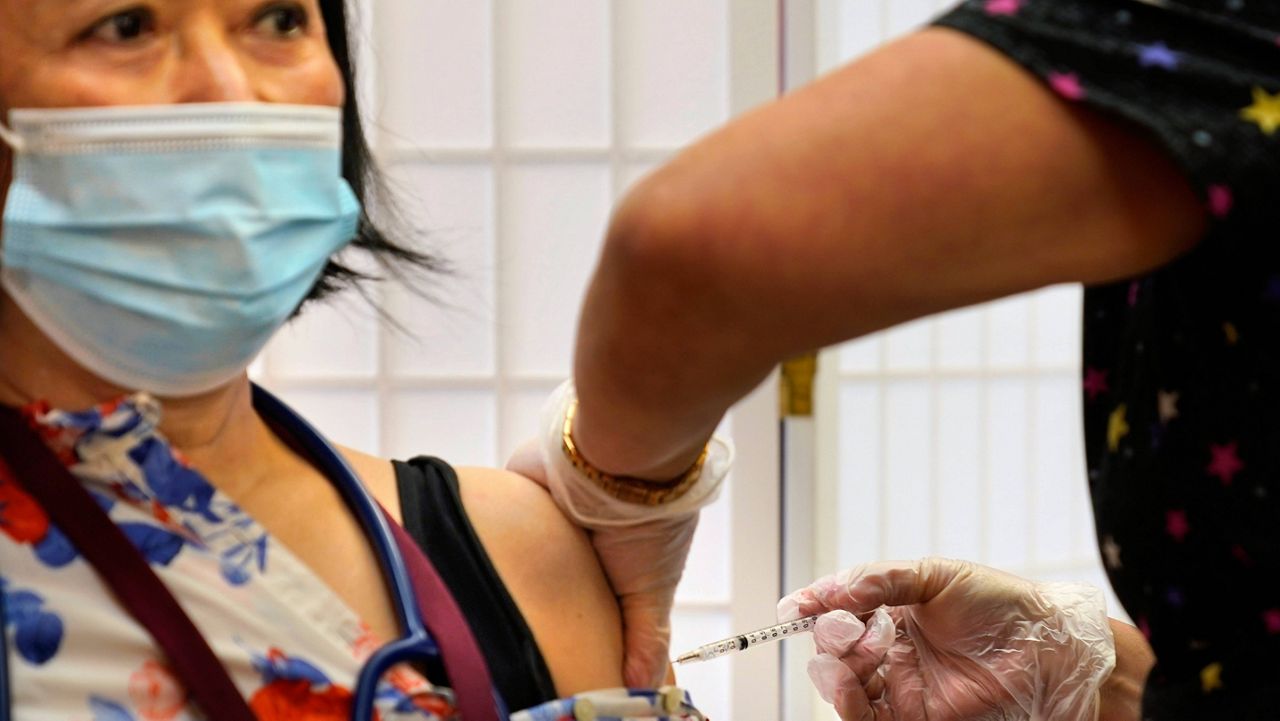A growing number of states, as well as New York City, have expanded eligibility for COVID-19 vaccine booster shots in recent days, going beyond the Food and Drug Administration’s authorization.
What You Need To Know
- A growing number of states, as well as New York City, have expanded eligibility for COVID-19 vaccine booster shots in recent days, going beyond the Food and Drug Administration’s authorization
- Arkansas, California, Colorado, New Mexico and West Virginia now allow anyone age 18 or older to receive a booster shot if they received their second Pfizer or Moderna dose at least six months earlier or the Johnson & Johnson shot two months before
- The FDA has granted emergency use authorization for the Pfizer and Moderna boosters for people who are 65 or older, who have underlying medical conditions, or who work or live in high-risk settings, such as prisons or homeless shelters
- But with winter approaching and COVID-19 cases climbing again, some state and local governments are applying a broad interpretation to the FDA authorization and CDC guidance more broadly
Arkansas, California, Colorado, New Mexico and West Virginia now allow anyone age 18 or older to receive a booster shot if they were administered their second Pfizer or Moderna dose at least six months earlier or the Johnson & Johnson shot two months before.
The FDA has granted emergency use authorization for the Pfizer and Moderna boosters for people who are 65 or older, who have underlying medical conditions, or who work or live in high-risk settings, such as prisons or homeless shelters. The Johnson & Johnson boosters, however, are authorized for all adults.
The Centers for Disease Control and Prevention recommends boosters for the same groups covered by the FDA authorizations.
But with winter approaching and COVID-19 cases climbing again, some state and local governments are applying a broad interpretation to the FDA authorization and CDC guidance.
In Colorado, where the positivity rate is 13.4%, the state Department of Public Health and Environment says COVID-19 is spreading so fast that almost every adult in the state is now considered to be living in a high-risk setting.
In New York City, where health officials on Monday began encouraging all adults who want booster shots to get them, Dr. Mitchell Katz, the head of the city’s public hospitals, pointed to the New York’s population density in making the case for why residents are at higher risk. Cases are up 25% in the city since Halloween.
“I think the more people get booster shots, the better, and we should take the broadest interpretation, the most inclusive interpretation, of who qualifies to ensure that people who want it get it and are not turned away,” Mayor Bill de Blasio said Monday.
In Arkansas, the Health Department said that some people found the FDA and CDC rules for booster shots confusing, hampering efforts.
"I think it'll eliminate some confusion, and it'll also encourage everyone across the board that meets this criteria to go get the booster shot,” Arkansas Gov. Asa Hutchinson said Monday. “That's the best protection from the virus and from serious health consequences."
The CDC said in a statement to Spectrum News on Tuesday, “Vaccine providers should administer vaccine in accordance” with the FDA authorizations. The FDA has not responded to an email seeking comment.
Last week, Pfizer asked the FDA to amend its emergency use authorization for boosters to cover all adults. The agency has not yet made a decision.
Pfizer and Moderna initially sought FDA clearance for boosters for all adults, but the advisory committees to the agencies expressed reservations, citing the vaccines’ continued success at preventing hospitalization and death.
The CDC advisers even voted against recommending Pfizer’s shots for people based on their work or living environments out of concern that it would effectively open the door for the vast majority of adults being able to receive boosters. However, in making the final decision, CDC Director Dr. Rochelle Walensky split with the committee and recommended the boosters for people who work or live in high-risk settings.
The vaccines still remain highly protective against severe COVID-19, but studies have shown that their effectiveness is weakening.
As of Sunday, the U.S. seven-day average for new daily infections stood at 80,823, up 27% since Oct. 24. Cases are on the rise in 30 states over the past two weeks, according to a New York Times database.
Health officials in states where case numbers are climbing say unvaccinated people still account for the overwhelming majority of COVID-19 hospitalizations and deaths, but they believe waning vaccine effectiveness is partially to blame.
More than 30 million Americans have received booster shots, accounting for 15% of people who have been vaccinated.



